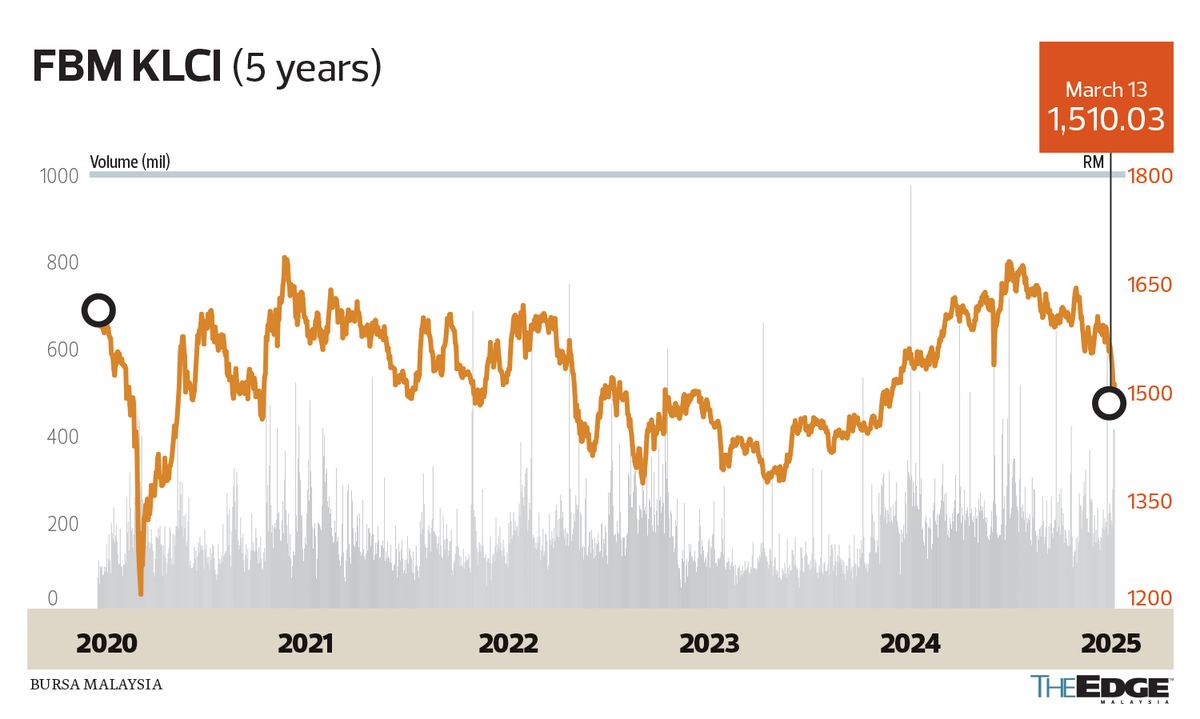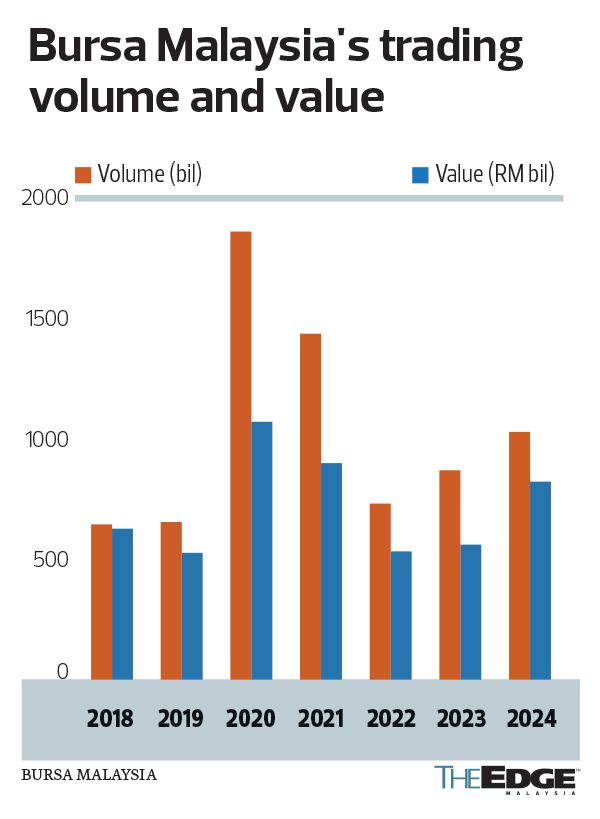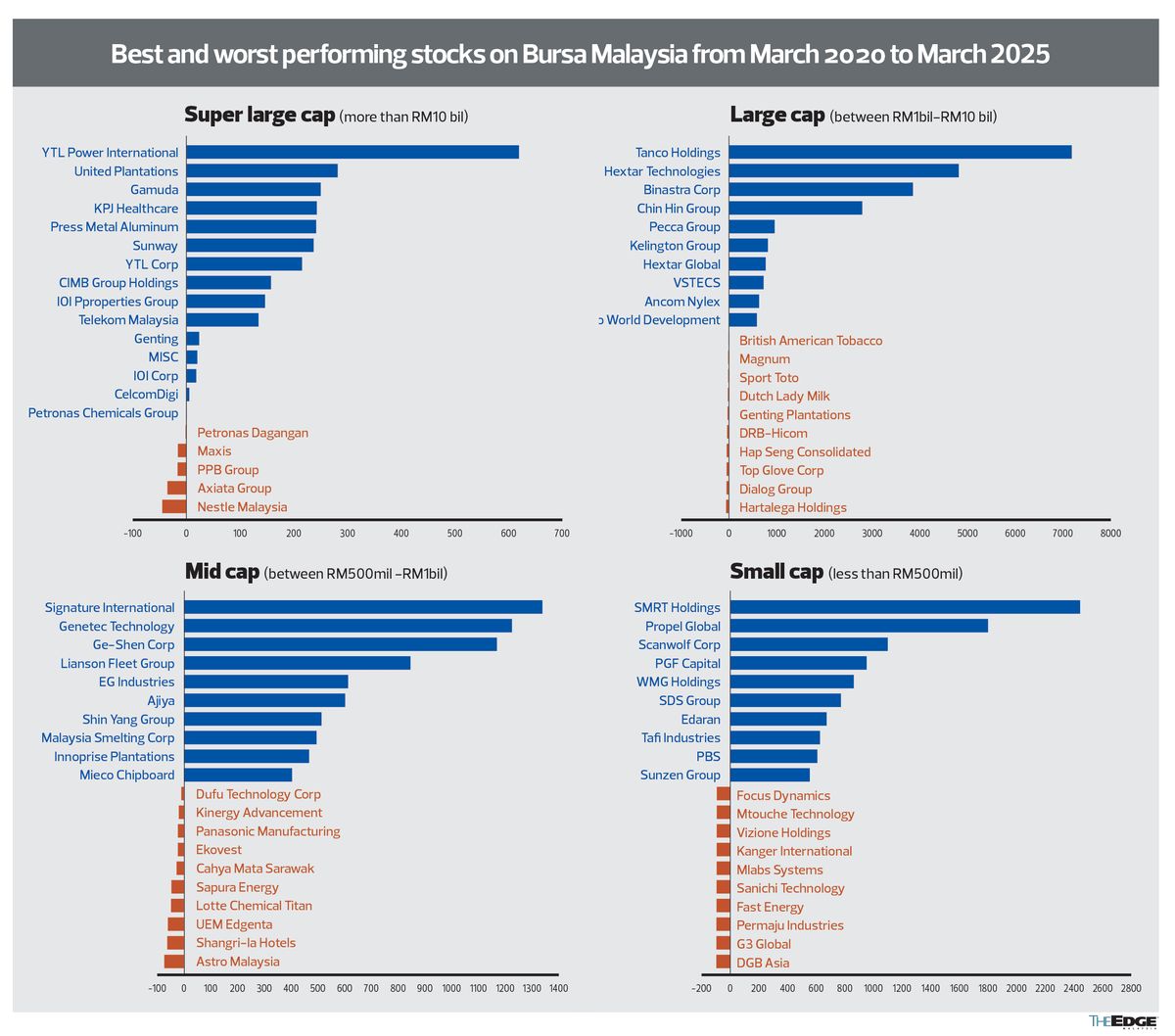
(Photo by Freepik)
This article first appeared in The Edge Malaysia Weekly on March 17, 2025 - March 23, 2025
FIVE years have passed since the Covid-19 pandemic rattled the world, with lockdowns starting in March 2020 that brought almost all economic activities to a standstill.
The unprecedented global health crisis triggered panic and equity routes. On March 19, a day after the first movement control order (MCO) was imposed to curb the spread of the virus, the FBM KLCI plummeted 20% to 1,219.72 points in just a month — the lowest seen since the global financial crisis in October 2009.
Meanwhile, the Dow Jones Industrial Average sank nearly 3,000 points or 12.9%, the largest single day drop, to close at 20,188 points on March 16.
While governments worked to break the chain of Covid-19 infections and prevent their economies from sliding into recession, stock markets, including Bursa Malaysia, staged a spectacular rebound just one month after the selldown in March 2020.
By the end of 2020, the FBM KLCI had surged to an all-time high. However, the rally in the benchmark index soon lost momentum amid domestic political turmoil, ultimately ending lower between 2021 and 2023.
The local market rebounded in 2024 as foreign investors were picking up stocks on Bursa.
In 2020 alone, the total value of securities traded on Bursa Malaysia surged to almost RM1 trillion, with RM242.14 billion of investors’ money being poured into the six largest rubber glove counters in the country.
Trading volume swelled to 1.8 trillion, driven by strong retail participation. According to Securities Commission Malaysia’s 2020 Annual Report, retail investors were the largest participants on Bursa Malaysia that year, with net buying amounting to RM14.3 billion, compared with RM10.3 billion by local institutional investors.
The participation rate of retail investors in terms of value traded rose to 32.4%, compared with 20.8% in 2019 and the five-year average of 21.4%.
Nevertheless, the trading value on Bursa Malaysia quickly declined, with total value traded dropping to RM822.07 billion in 2021, and almost halving to RM482.48 billion in 2022.
In 2024, retail participation rate was at 21%. The trading volume on Bursa Malaysia stood at 1.068 trillion units of securities with a total value of RM820 billion.
The glove mania is probably still fresh in investors’ minds with Top Glove Corp Bhd (KL:TOPGLOV) being the second most valuable stock on Bursa Malaysia after Malayan Banking Bhd (KL:MAYBANK). In contrast, none of the glove makers are component stocks of the FBM KLCI (see sidebar).
Besides, the steep climbs by penny stocks on Bursa Malaysia were equally exciting while everyone was staying home due to the MCO.
The penny stock fever on the local bourse had not been seen for at least 20 years since the dotcom bubble burst. The eye-popping share price rally lured long-absent retail investors to the stock market, lifting the daily trading volume to a record high of 10 billion shares on May 13, 2020.
Some attributed it to the six-month bank loan moratorium, which gave retail investors spare cash to invest in equities.
Many penny stocks reached multi-year highs, if not new peaks. Having several penny stocks, sometimes more than 10 counters, hitting limit up in a single day was common. The magnitude of the share price jumps evoked memories of the Second Board craze in the mid-1990s.
For example, the share price of loss-making bus operator Gets Global Bhd — now renamed One Glove Group Bhd (KL:ONEGLOVE) — reached a record high of RM4.05 in mid-November 2020, from just 16 sen earlier in the year. Its daily trading volume even exceeded its issued share capital, fuelled primarily by its announcement that it was venturing into glove manufacturing. The stock is trading at 21 sen currently.
Likewise, Inix Technologies Holdings Bhd’s share price soared to 89 sen in August 2020 from less than 10 sen a month earlier as it also planned to produce rubber gloves. It also revealed its intention to develop a Covid-19 vaccine and diversify into the durian plantation business.
The appointment of Macau billionaire Wan Kuok Koi, also known as “Broken Tooth”, as its chairman also put Inix in the limelight then.
The company, now known as Zen Tech International Bhd (KL:ZENTECH), is trading at one sen per share, giving it a market capitalisation of RM15.7 million.
Meanwhile, Fintec Global Bhd rode the meteoric rally of penny stocks by holding a portfolio of them as investments. Its quarterly net profit for the three months ended Sept 30, 2020 (2QFY2020) ballooned to RM720.5 million, from RM71.7 million in the same quarter a year earlier. Fintec recorded a “fair value gain on investment securities” of RM714.2 million in 2QFY2020.
It did not reveal the details of its investment portfolio as it is not required under Bursa Malaysia’s listing rules. However, based on disclosures of companies’ shareholdings through its wholly-owned subsidiary Asiabio Capital Sdn Bhd, Fintec held shares in Saudee Group Bhd (KL:SG) — now known as SaudiGold Group Bhd, VSolar Group Bhd (KL:VSOLAR), Komarkcorp Bhd (KL:KOMARK), Focus Dynamics Group Bhd (KL:FOCUS), Seacera Group Bhd (KL:SEACERA) and AT Systematization Bhd (KL:ERDASAN), which has changed its name to Erdasan Group Bhd. The big jumps in the companies’ share prices boosted Fintec’s fair value gains.
Notably, Fintec’s share price rocketed to an all-time high of RM4.75 in September 2020 from a 60-sen level. It undertook a one-for-one rights issue in November the same year at eight sen per share.
However, the upward momentum did not last. The stock closed at 14 sen last Thursday, giving it a market capitalisation of RM28.7 million.
Focus Dynamics, one of the companies that Fintec invested in, surged to a high of 84.5 sen in September 2020 from 15 sen six months previously. In 2020, the food and beverage group also exercised a rights issue of up to 2.04 billion irredeemable convertible preference shares (ICPS), raising RM112.44 million. The rights issue came with free warrants on the basis of three warrants for every two ICPS subscribed.
Roughly two years later, in December 2024, the company proposed a share capital reduction to wipe out accumulated losses of up to RM126.8 million. Its share price closed at two sen last Thursday.
LKL International Bhd (KL:LKL) saw its share price shoot up to RM13.68 in August 2020 from below RM1 in March that year. The hospital bed maker has been loss-making over the past four financial years. Its shares were traded at eight sen last Thursday, valuing the company at RM31 million.
Over the past five years, the top-performing stocks in the small-cap category have been led by SMRT Holdings Bhd (KL:SMRT), which gained 2,443%, followed by Propel Group Bhd (KL:PGB) with a 1,800% gain, and Scanwolf Corp Bhd (KL:SCW), which rose by 1,100%.
It is worth noting that the interest in SMRT came after the group announced the demerger from its education arm Minda Global Bhd, turning it into a pure technology play.
In 2017, the group expanded from being a human resources software company to one with interests in major bricks-and-mortar educational institutions when it took a controlling stake in Masterskill Education Group Bhd (MEGB), now known as Cyberjaya Education Group Bhd (KL:CYBERE).
Since the demerger, both SMRT and Cyberjaya Education have done well, with SMRT emerging as the winner in the small-cap category, while Cyberjaya Education saw its share price surge 130% over the last five years.
Meanwhile, the biggest losers are DGB Asia Bhd (KL:DGB), G3 Global Bhd (KL:G3), and Permaju Industries Bhd (KL:PERMAJU) 96.9%, 96.4% and 96.1% decline, respectively.
DGB, G3 Global and Permaju are loss-making companies. In 2020, Permaju, which was involved in property development, announced its plan to diversify into the healthcare space. Its share price soared to as high as RM1.07 on March 27, 2020, just a week after the first lockdown. Its share price has never recovered.
In the mid-cap category, the top gainers over the last five years are Signature International Bhd (KL:SIGN), Genetech Technology Bhd (KL:GENETEC), Ge-Shen Corp Bhd (KL:GESHEN), Liaison Fleet Group Bhd (KL:LFG) and Ajiya Bhd (KL:AJIYA).
Signature International, a kitchen cabinet maker, saw its share price rise by 1,339%, while safety glass maker Ajiya surged 602%. Prior to the emergence of similar new shareholders in the companies, their share prices had been trading below the RM1 mark.
In March 2021, Datuk Seri Chiau Beng Teik, the founder of Chin Hin Group Bhd (KL:CHINHIN), emerged as a major shareholder of Signature International after acquiring a 31.2% stake for RM93.6 million. In March 2022, Chin Hin Group emerged as the single largest shareholder in Ajiya with 24.68% interest. In September 2023, Chin Hin launched a mandatory general offer (MGO) for the shares in Ajiya it did not own at RM1.53 per share.
Over the past five years, the stock market has probably given investors, particularly the young ones, a crash course in equity investment. The reality can often differ greatly from textbook theories. While many anticipated a prolonged market slump as the world faced a severe health crisis that pushed the global economy to the brink of recession, billions of ringgit were, in fact, poured into the market at the height of the pandemic.
Save by subscribing to us for your print and/or digital copy.
P/S: The Edge is also available on Apple's App Store and Android's Google Play.
- World Economic Forum highlights EPF as model for sustainable retirement reform
- Li Ka-shing's CK Hutchison mulls global telco assets spin-off, eyes London listing, Reuters reports
- U Mobile secures MCMC award, gears up for nationwide 5G roll-out
- Indonesians feeling market gloom ahead of major holiday
- Seeking opportunities in a risk-off market
- Trump pressing advisers for tariff escalation ahead of April 2, Washington Post reports
- Myanmar's quake toll passes 1,000 as extent of devastation emerges
- MetMalaysia can issue quake warnings within eight minutes, says DG
- Li Ka-shing's CK Hutchison mulls global telco assets spin-off, eyes London listing, Reuters reports
- Vance accuses Denmark of not keeping Greenland safe from Russia, China



